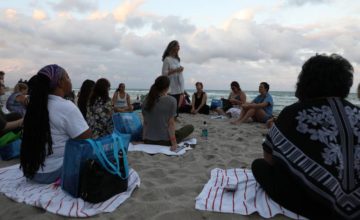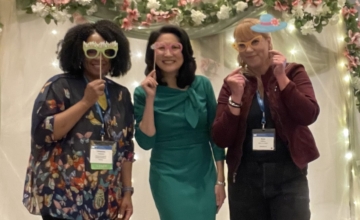Together, panelists and participants discussed the history of support in each of these areas, recent laws and legislative proposals, and examples of innovative practices. Three themes emerged from the discussions: (1) It is important to focus on both the “whole child” and “whole family” when addressing the economic security of families; (2) It is essential that we understand our past and create the future so that the next generation of policies and practices are anti-racist and promote equity; and (3) The field of early childhood can play an important supporting role in creating pathways to prosperity by building relationships, making sure the child development case for economic security policies is understood, and working in collaboration with those focused more directly on economic justice opportunities for families.
STORY OF BRIANNA CRUSOE
In 2018, Brianna Crusoe, mother of a 6-month old and a toddler, left her job at the casino and applied to the Women in Construction program at Moore Community House in East Biloxi, Mississippi. “I knew I was never going to be able to get ahead and provide for my family on the salary from the casino. My cousin showed me the Women in Construction flyer and I decided to step out on faith and applied,” said Crusoe. Three years later, Crusoe is a proud member of the International Brotherhood of Electrical Workers (IBEW). Her new life suits her family—at the casino, she had to work evenings and weekends; now she is able to work regular business hours and that means she has time to play with her children on the weekends, help them with their homework, and put them to bed at night. “I learned things in this program that I didn’t know I could do. I came in with no money, no financial help, and I kicked butt. I’m getting the same pay as these men out there; I’m stable now. I have health insurance, and vision and dental, too. And if I pass away today, my kids will have a death benefit. But the biggest thing for me was to have child care for my kids when I work. Knowing I had free child care let me know I could conquer anything,” said Crusoe. Crusoe recognizes that her skills are in demand. IBEW will easily place her anytime she might need a new job. And Women in Construction is there to help her, too. She still turns to them if she has questions or needs to make connections. “I was a struggling mother. This program gives women a second chance for stability and a career. It feels good to know that I have a career that will be here 10 years from now,” reflects Crusoe. More about the Women in Construction program is shared later in the education and training section of this report.
THE MAGNOLIA MOTHER’S TRUST
Started in 2018 with private funding, The Magnolia Mother’s Trust, a guaranteed income initiative of the Jackson, Mississippi, nonprofit organization Springboard to Opportunities, was created by and for residents living in federally subsidized low-income housing. “Our program is radically resident driven. We heard from our families that they couldn’t get to their goals without cash, and so together with the families, we designed the program,” said Sarah Stripp, Program Manager, Springboard to Opportunities—The Magnolia Mother’s Trust. The Magnolia Mother’s Trust provides a guaranteed income to low-income Black mothers who live in the target communities, opt-in to participate, and then are selected via lottery. Support is given in the form of $1,000 cash payments for 12 months, and $1,000 contributions to 529 education savings accounts for each child. Enrolled mothers participate in workshops on financial education, goal setting, and building capital. A social worker also supports the mothers to set personal goals, address mental health concerns, and return to school. Now in its third cohort, The Magnolia Mother’s Trust finds that mothers are feeling empowered to make choices including investing more time and energy to prioritize their children and education rather than juggling multiple jobs to barely make ends meet. The moms are saving for college and purchasing health and life insurance. A community of support and best practices for those interested in starting a guaranteed income support program can be found here: Guaranteed Income Community of Practice For more information: https://springboardto.org/magnolia-mothers-trust.
MOORE COMMUNITY HOUSE—WOMEN IN CONSTRUCTION PROGRAM
In 1924, Moore Community House began serving children of seafood workers in East Biloxi, Mississippi. Today, the nonprofit operates an Early Head Start program and a workforce training program for women in the construction and advance manufacturing fields.
The Women in Construction program started in 2008 in recognition that Mississippi women make up half of the workforce yet they represent 75% of those making minimum wage, leaving women-led families in persistent poverty despite full-time work. Moving mothers into living wage jobs requires countering race and gender bias and training women for occupations where they are underrepresented and could be better paid.
Women in Construction program leadership meets regularly with industry leaders to understand the skills workers need and then the program trains women accordingly. Free training programs range from a few weeks to a few months, with women graduating the program with marketable skills that are attractive to local industry—from shipbuilding to residential and commercial contractors. Graduates are able to enter jobs with starting wages of $15 per hour or more, double the state minimum wage. The program recognizes the importance of child care and therefore offers participants free child care for 6 months and during that time they connect the women to the state child care system to access ongoing benefits. In addition to the technical training and child care supports, women have access to workshops about legal rights, protections, sexual harassment, and financial management, all topics aimed at support women’s long-term independence and success.
More than 700 women have graduated from the Women in Construction program, and with a placement rate of 74%, the program is making a real difference for the economic well-being of families. “Job training and child care—it’s the magic road for economic security,” said Carol Burnett, Director, Mississippi Low Income Child Care Initiative, and Director, Moore Community House. And the unions and business community appreciate the program too because they know they will be hiring women with strong skills. According to Burnett, “We hear our graduates are great workers, and so they become the best ambassadors of the program. They are opening a lot of doors for other women to come behind them.” The Women in Construction program is funded primarily by the W.K. Kellogg Foundation, with additional support from private donations and local banks. The program has received some support from the U.S. Department of Labor including a Strengthening Working Families grant in 2016 and the Women in Apprenticeship and Non-Traditional Occupations in 2021. Funding to support the child care component of the program comes from a subgrant from the state TANF program. Importantly, the concept of training for available living wage jobs plus child care has carried over to a new statewide program that is broader than construction. Proof of concept from the Women in Construction program is bringing about more recognition of both the training and child care needs of parents. For more information: https://www.moorecommunityhouse.org
To learn more about Pathways to Prosperity, read here.




